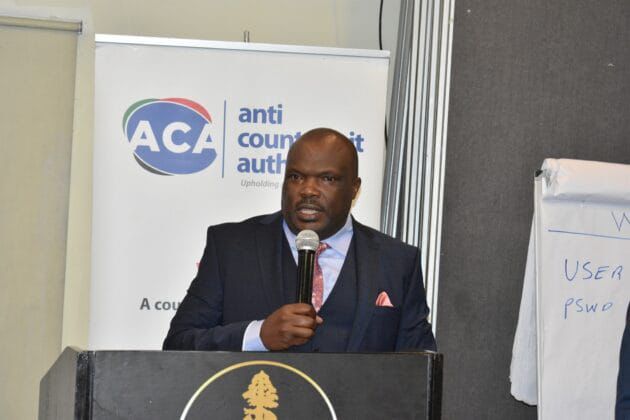
Kenya Grapples with a New Counterfeit War » Capital News
By Dr. Robi Mbugua Njoroge
Once confined to the dusty backstreets and informal stalls of Baba Dogo in Kasarani, counterfeit trade in Kenya has rapidly evolved into a sophisticated, tech-enabled enterprise. What was once a hustle of nocturnal deliveries in sacks and pickup trucks has now gone digital, thriving on sleek online platforms that blur the line between the genuine and the fake.
The 2024 National Consumer-Level Survey by the Anti-Counterfeit Authority (ACA) paints a sobering picture: Kenya’s counterfeit ecosystem has mutated into a complex network that fuses informal vendors, formal retail outlets, and—most significantly—digital marketplaces. This ecosystem is deeply embedded in the economy, exploiting both convenience and consumer trust.
Street vendors remain the most cited sources of counterfeit goods, according to 59.37% of respondents, followed closely by kiosks and small shops at 54.42%. Alarmingly, 21.31% of counterfeit purchases now occur in supermarkets—once considered safe spaces for consumers. Meanwhile, online platforms account for 31.27% of these transactions, a sign of the growing risk in Kenya’s digital marketplace.
From Instagram storefronts and Facebook groups to local e-commerce sites and WhatsApp forums, counterfeiters operate with near-total anonymity, vast reach, and impunity. Consumers are unknowingly buying fake pharmaceuticals, cosmetics, agro-inputs like seeds and fertilisers, vehicle parts, food items, and electronics—products with direct consequences for health, safety, and livelihoods.
This new face of counterfeiting is more than a nuisance; it’s a national challenge of unprecedented complexity. It is decentralised, difficult to trace, and often indistinguishable from legitimate commerce. For every authentic product in a cart—physical or digital—there is a counterfeit lurking beside it: cheaper, convincing, and potentially dangerous.
E-commerce, while offering unparalleled convenience, often lacks the verification safeguards required to protect consumers. Drawn by discounts and speed, shoppers are left with limited tools to verify authenticity before making purchases. This makes online platforms fertile ground for counterfeiters, who swiftly exploit regulatory and technological loopholes.
The problem is compounded by new data showing that 60.48% of consumers knowingly or unknowingly purchased counterfeit goods in the past year. Most discovered the truth only after using the product. Even more concerning is that nearly 70% of these purchases were unintentional. This deception not only shatters consumer confidence but also erodes the credibility of legitimate businesses and undermines Kenya’s broader economic goals.
To respond effectively, we must reimagine our enforcement, education, legal frameworks, and collaborative strategies. Traditional methods like market raids and border inspections remain essential—but they are no longer sufficient. The battleground has shifted, and we must meet the enemy mid-air in the digital realm.
At the Anti-Counterfeit Authority, we are adjusting our sails. We are ramping up digital surveillance and forging strategic partnerships with the Communications Authority, e-commerce platforms, and consumer watchdogs to monitor and clamp down on online violations. We are deploying product authentication technologies—including Bleep Technology, QR codes, and SMS-based systems—to enable real-time consumer verification.
Public education remains our strongest line of defence. Informed consumers can identify, avoid, and report counterfeit goods. That’s why we’re scaling up our outreach, combining town halls and roadshows with aggressive digital campaigns, influencer engagement, and vernacular messaging that resonates across Kenya’s diverse communities.
We are also working hand-in-hand with lawmakers to review and modernise our legal and regulatory frameworks. Kenya—and the East African Community as a whole—must align its intellectual property and consumer protection laws with the fast-evolving realities of the digital economy.
This is the work of a responsive and responsible public institution—one that refuses to be left behind. The ACA is not only enforcing laws; we are shaping policy, driving innovation, empowering consumers, and defending the integrity of Kenya’s economy.
If Vision 2030 is to be realised—through industrialisation, job creation, innovation, and global trade competitiveness—our markets must be safe, fair, and trustworthy. We must close the blind spots in the informal economy, and seal the cracks in our digital systems.
The new counterfeit war is digital, decentralised, and dangerously deceptive. But it is not unwinnable. With bold leadership, strategic investment, and united action, we can—and will—protect the credibility of Kenya’s markets. The ACA is committed to leading this fight with the urgency, vigilance, and integrity it demands.
Dr. Robi Mbugua Njoroge is the Executive Director of the Anti-Counterfeit Authority, the state agency mandated to combat counterfeit trade and promote intellectual property rights protection in Kenya.